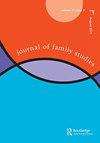“北欧转向”在日本具体化了吗?促进父亲休育儿假的政治以及与北欧制度的差异
IF 1.6
4区 社会学
Q3 FAMILY STUDIES
引用次数: 0
摘要
本文章由计算机程序翻译,如有差异,请以英文原文为准。
Has ‘Nordic Turn’ in Japan crystalized?: politics of promoting parental leave take-up among fathers and the divergence from the Nordic system
ABSTRACT Michael Rush sheds light on the Japanese ‘Nordic Turn’ in the family policy, including a father-friendly parental leave scheme after the 2000s in his work published in 2015. Despite this and the Japanese Government's apparent desire to encourage fathers to take parental leave, the policy does not seem effective as in Nordic countries. This paper examines what makes Japan's statutory parental leave scheme difficult to work like the ones in Nordic countries by analyzing the process of the amendments of the leave scheme after the 2014 amendment. The study pays particular attention to the views expressed by the various actors involved in the law-making process on the issue of the inconsistency between bonus months, which is a father quota, and the special extension of parental leave in case of no childcare place, and how this was reflected in the final bill. The paper reveals that the process was not confined to the Ministry of Health, Labour and Welfare but was heavily influenced by the work of the Cabinet Office, project teams of the ruling party, and private groups promoting work-life balance measures. Partly because of this, the Japanese parental leave system has diverged significantly from the Nordic and German systems to which it was originally referred.
求助全文
通过发布文献求助,成功后即可免费获取论文全文。
去求助
来源期刊

Journal of Family Studies
FAMILY STUDIES-
CiteScore
3.20
自引率
12.50%
发文量
52
期刊介绍:
The Journal of Family Studies is a peer reviewed international journal under the Editorship of Adjunct Professor Lawrie Moloney, School of Public Health, LaTrobe University; Australian Institute of Family Studies; and co-director of Children in Focus. The focus of the Journal of Family Studies is on the wellbeing of children in families in the process of change.
 求助内容:
求助内容: 应助结果提醒方式:
应助结果提醒方式:


